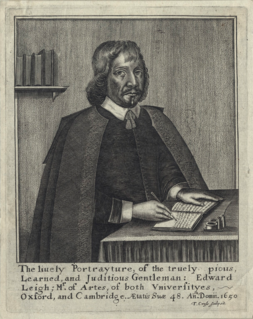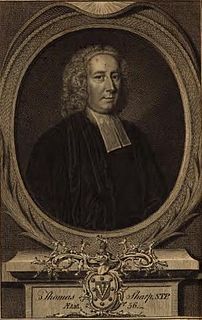This article has multiple issues. Please help improve it or discuss these issues on the talk page . (Learn how and when to remove these template messages)
|
William Falkner, D.D. (died 1682) was an English divine.
This article has multiple issues. Please help improve it or discuss these issues on the talk page . (Learn how and when to remove these template messages)
|
William Falkner, D.D. (died 1682) was an English divine.
Falkner received his education at Peterhouse, Cambridge, where he graduated B.A. in 1652, M.A. in 1656, and D.D. in 1680. On 23 July 1679 he was collated by the Bishop of Ely to the rectory of Glemsford, Suffolk. [1] He was also town preacher at the chapel of St. Nicholas, King's Lynn, where he died on 9 April 1682. By his wife Susan, daughter of Thomas Greene, merchant and alderman of Lynn (who died on 30 August 1680), he had several children.
He was a learned champion of the Church of England. His works are:

John Tillotson was the Anglican Archbishop of Canterbury from 1691 to 1694.

John Flavel (c.1627–1691) was an English Puritan Presbyterian minister and author.

White Kennett was an English bishop and antiquarian. He was educated at Westminster School and at St Edmund Hall, Oxford, where, while an undergraduate, he published several translations of Latin works, including Erasmus' In Praise of Folly.
Anthony Wotton was an English clergyman and controversialist, of Puritan views. He was the first Gresham Professor of Divinity. Christopher Hill describes him as a Modernist and Ramist.

John Collinges (1623–1690) was an English Presbyterian theologian, and prolific writer. He lived and worked in Norwich for more than forty years where he played a major role in reviving and administering the City Library. He was one of the representatives of the Presbyterians in the Savoy Conference, but was later forced to resign his livings.
Thomas Pierce or Peirse (1622–1691) was an English churchman and controversialist, a high-handed President of Magdalen College, Oxford, and Dean of Salisbury.
Thomas Marshall was an English churchman and linguist, Rector of Lincoln College, Oxford and Dean of Gloucester.

John Kettlewell was an English clergyman, nonjuror and devotional writer. He is now known for his arguments against William Sherlock, who had justified the change of monarch of 1688–89 and his own switch of sides in The Case of the Allegiance. According to J. P. Kenyon, Kettlewell's reply made a case "with which conformist Anglicans could only agree, because it was spiritual, while Sherlock's was resolutely aspiritual". He went on to attack defenders of the Glorious Revolution generally as proponents of fallacious contractarian theories.

Robert Grove (1634–1696) was an English Bishop of Chichester.

Sir Edward Leigh was an English lay writer, known particularly for his works on religious topics, and a politician who sat in the House of Commons from 1645 to 1648.

Thomas Comber (1645–1699) was an English churchman, Dean of Durham from 1689.
William Ross, 12th Lord Ross, was a Scottish nobleman, soldier and politician.

Edward Wetenhall (1636–1713) was an English bishop of the Church of Ireland. His name is also spelled Wettenhall, Whetenhall, Whitnall, Withnoll, and Wythnall.

William Nicholls (1664–1712) was an English clergyman and theologian, known as an author on the Book of Common Prayer.

Thomas Sharp (1693–1758) was an English churchman, known as a biographer and theological writer, archdeacon of Northumberland from 1723.
Edward Pelling was an English cleric and academic, a significant author in the first generation of High churchmen.
Thomas Grantham (1634–1692) was an English General Baptist minister, and theologian. He had access to Charles II of England, and made petitions on behalf of Baptist beliefs.
William Payne (1650–1696) was an English academic and cleric of the Church of England, known as a controversialist.
James Durham was the eldest son of John Durham of Easter Powrie, north of Dundee. He was educated at University of St Andrews, and betook himself to the life of a country gentleman. While visiting his mother-in-law in the parish of Abercorn, he came under profound religious impressions in consequence of a sermon by Melvill, minister of Queensferry. Joining in the Civil War, he was promoted captain, and seriously exhorted and led the devotions of his company; this being noticed by Professor Dickson, he was induced to prepare himself for the ministry, a resolution which was hastened by two narrow escapes on the battlefield. He graduated M.A.. He was licensed for the ministry by the Presbytery of Irvine 18 May 1647. He was admitted to the congregation of Blackfriars 2 December 1647. Durham was appointed chaplain to the King July 1650. He called 4 September 1651, with charge of West Quarter of the city. He endeavoured, without success, to effect a union between the two contending parties in the Church in 1652. He died of consumption, 25 June 1658.
John Wiltshire was an English stage actor of the Restoration Era. He joined the King's Company in 1675, before transferring to the rival Duke's Company in 1679 possibly as a replacement for Matthew Medbourne who was arrested in the Popish Plot and subsequently died in Newgate. From 1682 until his death he was part of the merged United Company. According to the autobiography of Colley Cibber he subsequently joined the English Army as captain and was killed in action fighting with William III's forces in Flanders during the Nine Years' War. His surname is also sometimes spelled as Wilshire.
![]() This article incorporates text from a publication now in the public domain : "Falkner, William". Dictionary of National Biography . London: Smith, Elder & Co. 1885–1900.
This article incorporates text from a publication now in the public domain : "Falkner, William". Dictionary of National Biography . London: Smith, Elder & Co. 1885–1900.